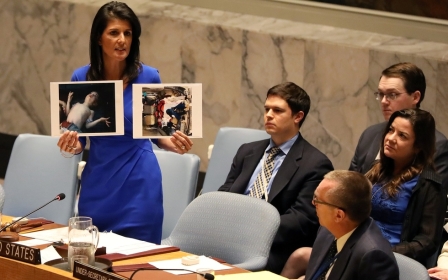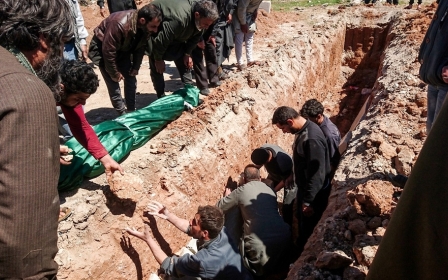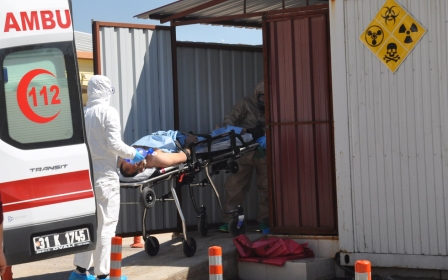ANALYSIS: Syria justice held hostage by geopolitics amid gas attack
UNITED NATIONS – Another day, another deadlock.
United Nations Security Council talks on Syria hit a familiar snag on Wednesday, with clashes between the United States, Russia and other members blocking action on the latest case of poison gas killings in the country’s civil war.
Diplomats sparred over whether Syria’s government caused the incident in Khan Sheikhoun, Idlib province, which killed dozens of children and adults on Tuesday, as veto-wielding Russia continued to defend Syrian President Bashar al-Assad and his forces.
For the victims who want to see war criminals behind bars, this is a pity. Their sentiments were magnified as footage of infants in northwest Syria choking and foaming at the mouth spread via television and social media.
'Justice here is a hostage to politics, but politics is a fickle thing and it can take sudden and unexpected turns'
-Alex Whiting, a former ICC lawyer
The UN’s 15-nation council is the only body empowered to kick-start a probe by the International Criminal Court (ICC), a permanent war crimes tribunal with jurisdiction across much of the globe, but none in Syria, which never signed the court’s treaty.
In 2014, Russia and China vetoed Syrian atrocities being referred to the ICC. Another option on the council table – creating a bespoke, UN tribunal like those used after genocides in Cambodia and Rwanda – would likely fail for the same reason.
With the administration of US President Donald Trump edging closer towards accommodating Russian and Iranian efforts to keep Assad in power once the six-year-old war grinds to a halt, prospects for justice are bleak.
“Though the crimes in Syria are on a staggering scale, there has been a blockage for any accountability,” Alex Whiting, a former ICC lawyer, told Middle East Eye.
“But I remain optimistic that there will be accountability. One day, there will be a transition and then there will be questions about who is to be held responsible for these horrific crimes.”
War crimes
For Whiting and others, Syrian atrocities doubtlessly amount to war crimes. Targeting civilians with chemical weapons, as Britain, the US and others allege Syrian government forces did this week in Khan Sheikhoun and previously, is illegal. The government denies the accusations.
Blame for chemical attacks and the bombing of civilian areas is often levelled against Syrian government forces because of witness testimonies, the areas being targeted and because none of the rebel groups fighting in Syria have warplanes.
The same goes for a strike on an aid convoy near Aleppo in November. The alleged execution of some 13,000 dissidents at the military-run Saydnaya Prison, near Damascus, has also been cited as a war crime and a crime against humanity.
The UN also points the finger at rebels for atrocities, such as preventing civilians from fleeing Aleppo when the city was attacked last year. The Islamic State (IS) group does little to conceal its outrages and, in some cases, advertises them as propaganda.
IS militants have spread terror by beheading, stoning and shooting civilians, destroying communities of Yezidis, Shia and other minorities and enslaving women, the UN says, both in Syria and in neighbouring Iraq.
As fighting increasingly favours Assad, members of his ruling clique who have been linked to atrocities will likely dodge the scrutiny of foreign courts by staying in Damascus and other parts of government-run Syria, Whiting said.
That is less true for IS and other rebels whose territories are shrinking. Their commanders may be forced to flee and risk capture by Turks, Kurds, Iranians or one of the other armies operating on Syrian soil.
Militants linked to IS and al-Qaeda have no friends in Damascus, Ankara, Moscow, Washington, Tehran or Baghdad to turn to.
This week, a senior US State Department official said that Interpol has details of more than 14,000 fighters who have travelled from some 60 countries to join IS and could face justice should they return home.
The 60-plus nation coalition fighting the group is working to “shut down the ability of ISIS-affiliated individuals to move across borders” said the official, speaking on condition of anonymity and using an alternate acronym.
While indicting Assad’s security chiefs is a far-off prospect now, experts said, the slow-moving wheels of justice eventually caught up with Chile’s Augusto Pinochet and Slobodan Milosevic, of the former Yugoslavia.
Whiting points to uncertainty in Syria. Though Assad has weathered the 2011 uprising against his rule, the war drags on in a fragmented nation. He faces many challenges and a new political force in Damascus could benefit from selling out his old guard.
“Justice here is a hostage to politics, but politics is a fickle thing and it can take sudden and unexpected turns,” said Whiting, a Harvard Law School academic.
“Assad’s government has a lot of blood and criminality on its hands. Right now, it has the support of Russia and perhaps the Trump administration is swinging that way too. But is that sustainable? Will other governments distance themselves? Will there be pressure for his government to be moved aside?”
As an example, he cited the UN Special Court for Sierra Leone, which was set up in 2002 with the agreement of the government to prosecute murders, rapes, mutilations and the use of child soldiers in that country’s 1991-2002 civil war.
There is no criminal tribunal for Syria yet, but the Commission for International Justice and Accountability (CIJA) is laying groundwork for prosecutions. It has documented torture and murder of detainees by Assad’s government for four years.
Funded by the UK, Germany and others, CIJA collects photos and documents that were smuggled out of Syria. They include 700,000 pages of intelligence files and 55,000 photos of detainees’ bodies, which were taken by a forensic photographer, code-named Caesar.
An investigation by the UN and the Organisation for the Prohibition of Chemical Weapons (OPCW) found Syrian government forces were responsible for three chlorine gas attacks in 2014 and 2015 and that IS had used mustard gas.
'Universal jurisdiction'
In December, faced with deadlock in the Security Council, the UN’s 193-member General Assembly voted to create a mechanism to collect evidence of crimes in Syria and share it with prosecutors around the world.
'Those who are implicated in the commission of these crimes should not think that they are forever immune or sheltered from prosecution'
-Richard Dicker, lawyer with Human Rights Watch
A European diplomat involved in the body described a “novel” and “quasi-prosecutorial office”. Speaking on condition of anonymity, he told MEE the legal initiative may share evidence with European courts capable of prosecuting crimes anywhere in the world.
Others pin hopes on such courts with “universal jurisdiction”. According to rights watchdog Amnesty International, France, Germany, the Netherlands, Norway, Sweden and Switzerland are all processing investigations on Syria.
In 2015, a Swedish court sentenced a Syrian rebel to five years behind bars for a “torture-like” assault in Syria that was was widely circulated on social media. Another rebel was sentenced to life for taking part in the mass killing of seven captured government soldiers in 2012.
Spanish authorities have begun proceedings against nine Syrian government officials over claims of the torture and execution of a detained man, in a case brought by the alleged victim’s sister, a Spanish woman of Syrian origin.
Given the large number of Syrian refugees in Germany, courts there are in the spotlight. Last month, nine Syrian torture survivors filed a complaint with Germany’s federal public prosecutor against a group of high-ranking Syrian officials.
“Sealed, non-public arrest warrants can be issued by some prosecutors and courts with no statute of limitations. They won’t expire in four or ten years’ time,” Richard Dicker, a lawyer with the pressure group, Human Rights Watch, told MEE.
“Those who are implicated in the commission of these crimes should not think that they are forever immune or sheltered from prosecution.”
Such cases have big flaws: they are piecemeal, and unlikely to satisfy all victims. Accused men seldom turn themselves in for questioning. This will mean some cases are dropped, while others may result in convictions of individuals who remain at large, in Syria or elsewhere.
That does not rule out the possibility of a Syrian general taking an ill-advised flight to Paris, many years from now, only to be greeted by an arrest warrant at the airport. A quick shopping jaunt could quickly become years of court hearings.
“Accountability is a long game here,” added Dicker.
“Those responsible for these types of crimes should wake up and smell the coffee. Russia may block referrals to the ICC in shameful protection of its partners in Damascus, but it cannot block the reach of law in the 21st Century, as it has evolved.”
Middle East Eye propose une couverture et une analyse indépendantes et incomparables du Moyen-Orient, de l’Afrique du Nord et d’autres régions du monde. Pour en savoir plus sur la reprise de ce contenu et les frais qui s’appliquent, veuillez remplir ce formulaire [en anglais]. Pour en savoir plus sur MEE, cliquez ici [en anglais].





